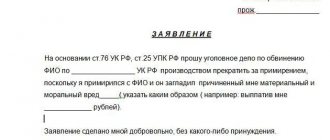Anything can happen in life. Sometimes the situation turns out in such a way that the polite address of an employee of the Ministry of Internal Affairs is followed by his offer to go to the department and resolve an incomprehensible situation. Any criminal must be mentally prepared for the fact that his actions will be revealed and he will come to the attention of the police. But what about ordinary citizens, for whom such a demand from a policeman in the middle of the day is like a bolt from the blue?
The rules of behavior at the time of arrest and in the police station itself are unclear for many people. We’ll talk further about what you can’t do and what rights of a person detained by the police can and should be implemented and observed.
Types and reasons for detention
Detention can be either single - if the situation does not indicate the commission of a crime, and a check is simply necessary (then a police officer can escort the citizen to the department on his own, for example, in a patrol car), or group , when the efforts of an entire squad of police are required. In the same way, it can be a planned detention (capture) or in fact, “spontaneous”.
The latter happens if the police officer reasonably suspects a person of something (external resemblance to a wanted criminal, suspicion of alcohol intoxication in a public place, etc.). Such a detention will come as a surprise not only to the citizen who is to be transported to the police station, but also to the authorized official himself.
The grounds for detention are listed in the Federal Law “On Police” (Article 14). According to paragraph 2 of the mentioned article, a law enforcement officer is authorized to make an arrest if a person :
- is suspected of committing a crime;
- must be taken into custody on the basis of the Code of Criminal Procedure of the Russian Federation;
- escaped from custody;
- sentenced to criminal punishment or administrative arrest and evades this punishment;
- is wanted;
- is a person who is being investigated for an administrative offense;
- evades the medical or educational measures prescribed to him by the court;
- illegally entered a protected facility;
- violated curfew (if imposed);
- escaped from a mental hospital;
- is suspected of attempting suicide or has already attempted it and may be dangerous to himself and/or others;
- is a national of another state that has submitted a request for the extradition of the detained citizen.
Any of these grounds is a legitimate reason for providing law enforcement officers with explanations and testimony within the walls of the Ministry of Internal Affairs department. To implement this requirement, the citizen must be detained and taken to the police station.
What influences the court's decision in a case of assault on a police officer?
Assaulting a police officer is a more serious offense than disobeying or resisting. It is punishable under Articles 317 and 318 of the Criminal Code. In especially serious cases, the offender may be sentenced to life imprisonment.
The presence or absence of a direct threat to the life of the policeman, the degree of harm caused, and the physical and mental state of the attacker play a role here.
Ideally, when considering such cases, the court is obliged to take into account all the circumstances, but in practice, prepare for the fact that the court will be biased against you.
What rights does a detainee have?
If there are grounds for detention, not only authorized persons who can deliver a citizen to the police station, take explanations from him and draw up a protocol have certain rights.
The state also gives rights to a person when detained by the police so that he can protect himself and ensure his chosen tactics of behavior.
Upon arrest
In itself, the detention and delivery of the detainee to the interrogating officer are not criminal procedural procedures - they are so-called. security nature.
Directly upon arrest (as during any interaction with an authorized officer during execution), a citizen has the right to know the name of the person detaining him. To do this, the policeman must introduce himself: give his name, position and rank (Article 5, paragraph 4 of the Federal Law “On the Police”).
At the first request of the detainee, the employee must present his identification . In addition, this same article gives a citizen the right to know on what basis he is detained - the policeman must inform the purpose of the appeal, as well as the reasons for the detention. At the same time, the law obliges the police officer to explain to the detained person all his rights.
If there are materials and documents that directly affect the freedoms and rights of detained persons, the police must give the opportunity to familiarize themselves with these materials, unless this is prohibited by federal law.
Each person detained for objective reasons is endowed with a list of certain rights of a suspect (although at the time of detention he is not legally such) - for example, to an interpreter or to a defense lawyer, if necessary. The detainee also has the right to notify his relatives or loved ones about the detention, as well as the opportunity to refuse to testify - the law does not require this.
The right of a detainee to a lawyer is constitutionally enshrined in our country (Article 48, Part 1).
A lawyer must have a lawyer's license and a warrant (confirms the lawyer's right to participate in a criminal case, issued by the bar association - Article 6, Part 2 of the Law “On Advocacy and the Bar”) - then he can be admitted to the process as a defender of the rights of the suspect ( and therefore the accused). A lawyer can be either privately invited by the detainee or appointed by the state and paid for from the federal budget. The right to a telephone call upon arrest must be exercised within the first three hours from the moment of delivery to the station.
A call to relatives or trusted persons can be made either by the detainee personally (in the presence of the interrogating officer) or by an authorized officer, if the detainee has expressed such a desire. If criminal prosecution is underway, the telephone conversation must take place in Russian. The right to testify or refuse to do so also depends on the will of the detainee. As a rule, at the very beginning, an explanation is required from the citizen, but this is a preliminary procedure preceding interrogation - an official procedural action.
Giving preliminary explanations is in no way regulated by the criminal procedure code and information obtained as a result of giving explanations cannot in any way serve as evidence in the case. The charges will be based on information that investigators learn during interrogation.
Simply put, the detainee (not yet a suspect) can independently choose the tactics of his own defense at this stage, before the arrival of a lawyer: refuse to give explanations about the case with reason; state in detail the circumstances that he considers necessary to report; remain silent or even give false explanations. For the latter, by the way, the detainee will not bear any responsibility.
When drawing up a protocol
The fact of preparing and finalizing a detention protocol has a semantic aspect - it is from the moment the protocol is issued that the detainee acquires the “official” status of a suspect in an offense or crime.
If the detention is administrative, a protocol must be drawn up immediately upon delivery of the citizen to the station - drawing up a document by an official upon arrival at the station is within the rights of the administratively detained person. If a crime is suspected, three hours are given to draw up a report.
The detainee has the right to set out in the protocol all the circumstances of both important events related to the detention, and the detention itself, down to the smallest detail (“at the time of detention, he was wearing neat, clean clothes, and had no bodily injuries”).
The arrest report should be read very carefully - if you do not agree with any fact, you should note it in the report . Under no circumstances should you leave empty lines and fields in this document - it is better to put dashes there.
Whether to sign the protocol or not is also a citizen’s right. In addition, the detained person (now a suspect) has every right to receive a copy of the arrest report and know what he is suspected of.
If a decision has been made against a person to initiate a criminal case against him, or to apply a certain preventive measure to him, copies of these documents must also be provided to him (p. 46, paragraph 4 of the Code of Criminal Procedure of the Russian Federation).
A citizen has the right to file a complaint and write a statement regarding illegal actions or inaction of government officials.
Rights of a detainee during a criminal case
The rights of a person suspected of committing a criminal offense are a direct continuation of the rights during arrest and are in many ways identical to them.
The suspect has the right to qualified defense (lawyer) and, if necessary, to an interpreter, the right to testify or remain silent.
Knowing what he is suspected of and having copies of the reports on the case is also the inalienable right of a suspect during criminal arrest .
A suspect can meet with a lawyer an unlimited number of times to conduct his affairs - this is relevant if a citizen is engaged in entrepreneurial activities and must continue to conduct business. However, there is another, property, limitation.
As part of the investigation, any transactions with property , valuables and funds of the suspect, which theoretically could be seized by the court, are prohibited.
Finally, the suspect can participate in investigative activities (with the permission of the investigator leading the case), present evidence of his innocence and defend himself by any means that do not contradict the current legislation of the Russian Federation.
How should detention take place?
Detention begins from the moment of personal contact with a law enforcement officer, during which the official is obliged to identify himself and explain the reasons for the detention. At the same time, the policeman has the right, in case of resistance, to use special equipment - handcuffs, a baton, and even use service dogs.
Therefore, when communicating with police officers, you should behave calmly , with dignity, not resist, and in no case insult law enforcement officers. Subsequently, if it is necessary to write a character reference for a detainee, his behavior during detention will play a role in drawing up a psychological portrait. Also, you should not attempt to hide from the police or threaten them.
If law enforcement officers are going to conduct a personal search , it is important to remember that an official of the same sex as the person being searched has the right to conduct it in the presence of two witnesses of the same sex . Afterwards, an inspection protocol is drawn up, or a corresponding entry will be made in the detention protocol.
Terms of detention
The duration of detention is described in Article 27.5 of the Code of Administrative Offences. If the detention is of an administrative nature, then its duration cannot exceed three hours .
If a citizen violates customs rules, including encroaching on the regime of the state borders of the Russian Federation, they have the right to detain for 48 hours (similarly, if an administrative offense is committed, the punishment for which is administrative arrest).
Attention: the total period of detention is counted from the moment the detained person is delivered to the Ministry of Internal Affairs.
If a person is suspected of committing a crime, he may also be detained for a period not exceeding 48 hours . During this period, as a rule, a court decision is made. In case of extension by court decision, the period of detention may be increased to 72 hours (3 days) .
The period of detention should generally not exceed five days (120 hours). If by this time the court has not chosen a preventive measure, the detained citizen must be released.
Punishment and fine for resisting arrest
Administrative liability for disobedience to a police officer’s request is the mildest. It provides for a fine of up to 1 thousand rubles. or arrest for up to 15 days.
Criminal liability is more significant. Resistance to a police officer when he was stopping hooliganism is punishable by a fine of up to 1 million rubles. (or in the amount of the offender’s income for a period of up to 4 years), forced labor for up to 5 years, or imprisonment for up to 7 years. Responsibility for organizing, preparing mass riots with armed resistance to a police officer (as well as participating in them) - imprisonment from 8 to 15 years.
Often, resisting a police officer is considered violence against him. Even if the health and life of the policeman were not endangered, the punishment for his actions is impressive. This is a fine of up to 200 thousand rubles. (or in the amount of the offender’s income for a period of up to 18 months), forced labor for up to 5 years, arrest for up to six months, or imprisonment for up to 5 years. If the court finds that the violence was nevertheless dangerous to the life or health of the policeman, the perpetrator faces imprisonment for up to 10 years.
Public insult to a police officer while on duty, which usually occurs at the moment of resistance, is punishable by a fine of up to 40 thousand rubles. (or in the amount of the offender’s income for a period of up to 3 months), compulsory work for up to 360 hours or correctional labor for up to a year.
The most severe punishment is when a citizen, while resisting, commits an attack on the life of a police officer. The punishment for this is imprisonment for a term of 12 to 20 years with restriction of freedom for up to 2 years or life imprisonment.
Where to contact if rights are violated
Another of the rights of a detainee is the right to appeal against unlawful actions of law enforcement officers.
Any illegal action or inaction; a decision with which the detained person does not agree may be appealed by him. This right provides a guarantee for the protection of the rights and freedoms of a citizen in the legal process. Complaints against employees are submitted to the Main Directorate of Internal Security of the Ministry of Internal Affairs . This can be done either orally (by calling the CSS) or in writing. In the latter case, it does not matter whether the paper is handwritten or printed on a computer.
If information about unlawful actions (inaction) of police officers is provided via a telephone call, the first step is to ask that this call be recorded.
The content of the complaint, regardless of how it is filed, must include information about the applicant - last name, first name, patronymic, address, contact and passport details. When stating the essence of the appeal, it is necessary to indicate the names and ranks of the employees of the Ministry of Internal Affairs against whom the complaint is being filed. If this is unknown, it is necessary to describe their appearance in as much detail as possible in order to facilitate the identification of the official who violated the rights of the citizen.
An internal investigation will be carried out upon the complaint and, if the complaint is confirmed, the perpetrators will be punished accordingly.







